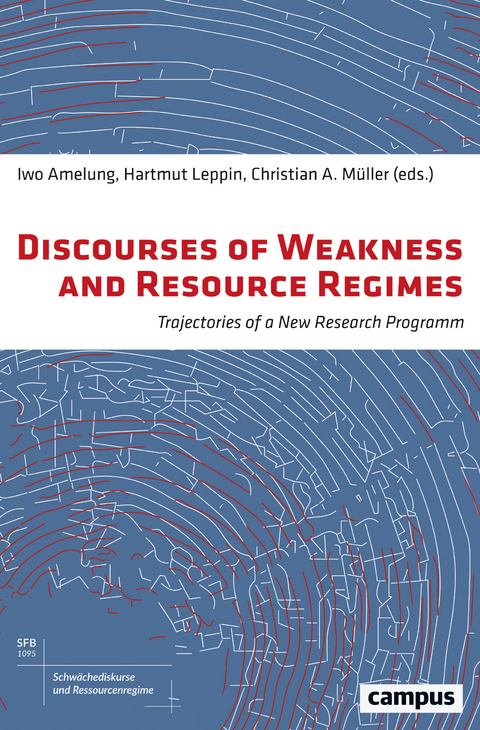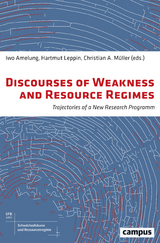Discourses of Weakness and Resource Regimes
Iwo Amelung ist Professor für Sinologie an der Universität Frankfurt am Main. Hartmut Leppin ist Professor für Alte Geschichte an der Universität Frankfurt am Main. Christian A. Müller ist wissenschaftlicher Mitarbeiter am SFB 1095 an der Universität Frankfurt am Main.
Contents
Introduction 9
Iwo Amelung, Hartmut Leppin, and Christian A. Müller
Chapter 1: Weakness: Ranges of Disciplinary Approaches 29
Kathrin Knodel and Anselm Spindler
Chapter 2: Representations of Weakness:
Functions, Images, Effects 53
Klaus SeidlChapter 3: Visions of Decline in Transhistorical Perspective:
Narratives, Images, Effects 79
Nadine Eikelschulte, Philipp Höhn, Sebastian Riebold, Klaus Seidl, and David Weidgenannt
Chapter 4: Counting Weakness?
The Institutionalisation of Data Collection in the Nineteenth Century German Chemical Industry and Meteorology 151
Linda Richter and Frederic Steinfeld
Chapter 5: Resources-A Historical and Conceptual Roadmap 179
Daniel Hausmann and Nicolas Perreaux
Chapter 6: Perspectives of a Resource History:
Actions-Practices-Regimes 209
Christian A. Müller
Chapter 7: Resources in a Social World 223
Otto Danwerth, Teresa Dittmer, Seto Hardjana, Daniel Hausmann, Nicolas Perreaux, Linda Richter, Christian Scheidler, Frederic Steinfeld, and David Weidgenannt
Chapter 8: Power and Resource Regimes: A Study of the Impact
of Social Relationships on the Function of Resources 255
Anna Dorofeeva and Alexander Krey
Chapter 9: Agency and Asymmetries: Actors and their Access
to Resources in Colonial and Developmental Setting 293
David Rex Galindo, Melina Kalfelis, and José Luis Paz Nomey
Authors 328
A Word from the Editors
The acquisition and distribution of resources is one of the central challenges of our times. Survival, as well as the seizing of development opportunities, compels actors-be they states, groups or individuals-to use resources to achieve their objectives. The continuous inequality (and what economists frequently refer to as scarcity) in the distribution of resources throughout history, is also the cause for numerous individual, social and international conflicts. This constitutes a challenge for academic research: how do actors refer to their situation in terms of their usage of resources? How do they talk about their deficiencies? This very connection is the starting point for the present series Discourses of Weakness and Resource Regimes. Discourses that deal with weakness are a phenomenon that can be observed in all societies at all times. Frequently, those discourses are directly connected to the question of agency and the required resources. Employing a humanities perspective, the series examines the problem of how discourses of weakness influence the deployment and usage of resources. It delves into the question of how actors' self-description and self-assessment impact on and shape the handling and usage of resources.
The English and German texts in this series combine contributions from historians, cultural studies specialists and philosophers on the multi-faceted changes of resource processes encompassing the evaluation, acquisition and handling of resources. It seeks to avoid a narrow understanding of resources, and, for instance, a conceptual bifurcation between natural and immaterial resources, and hopes to find robust and resilient alternatives to such distinctions. It is expected that the research results will help to further develop existing concepts of transformation and thus contribute to expanding approaches of modelling substantial historical change. The series presents the research results of the Frankfurt Collaborative Research Center 1095 Discourses of Weakness and Resource Regimes, which sought to find and evaluate new approaches to the problem of resources.
Introduction
Iwo Amelung, Hartmut Leppin, and Christian A. Müller
I. Towards the Interdependence of Self-placements and Self-efficacy
The acquisition and distribution of resources is one of the central challenges of our times. Survival, as well as the seizing of development opportunities, compels actors-be they states, groups or individuals-both to use and to exploit resources in order to achieve their objectives. The continuous inequality (and, what economists prominently refer to as, scarcity) in the distribution of resources throughout history is also the cause for numerous individual, social and international conflicts. This constitutes a challenge for academic research: How do actors refer to the situation in which they find themselves in terms of their usage of resources? How do they talk about their deficiencies in resources? Beyond such phenomena of self-perception, the dimensions of practice and the conditions for action are also of interest: Which factors influence the agency of an actor, and how are these factors shaped? How-to sum up-can such a multi-layered phenomenon as the configuration of capacity to act be described?
Currently, different disciplines offer different answers: production factors (as in economics ), resilience (as in psychology ), or majorities (as in political science ). Historical science stresses the contingency of the capacity to act, meaning the dependency on historically, culturally and geographically variable factors. The ability to act is always "socio-culturally" mediated, so it is not something that was available to the actors at all times, but was shaped differently at different times, and thus needs an explanation of its diverse occurrences. To register phenomena of this kind, analytical boundaries need to be set up: if we assume that the configuration of the capacity to act has
| Erscheinungsdatum | 16.08.2018 |
|---|---|
| Reihe/Serie | Schwächediskurse und Ressourcenregime | 1 |
| Co-Autor | Iwo Amelung, Otto Danwerth, Theresa Dittmer, Anna Dorofeeva, Nadine Eikelschulte, David Rex Galindo, Seto Hardjana, Daniel Hausmann, Philipp Höhn, Lukas Jäger, Melina Kalfelis, Kathrin Knodel, Alexander Krey, Hartmut Leppin, Christian A. Müller, José Luis Paz Nomey, Nicolas Perreaux, Linda Richter, Sebastian Riebold, Christian Scheidler, Klaus Seidl, Anselm Spindler, Frederic Steinfeld, Carla Thiel, Marco Toste, David Weidgenannt |
| Verlagsort | Frankfurt |
| Sprache | englisch |
| Maße | 142 x 215 mm |
| Gewicht | 423 g |
| Themenwelt | Geisteswissenschaften ► Geschichte ► Geschichtstheorie / Historik |
| Geschichte ► Teilgebiete der Geschichte ► Kulturgeschichte | |
| Schlagworte | Handlungsfähigkeit • Macht • Ordnung • Ressourcen • Ressourcengeschichte • Schwäche • Schwächediskurse • Transformation |
| ISBN-10 | 3-593-50901-6 / 3593509016 |
| ISBN-13 | 978-3-593-50901-3 / 9783593509013 |
| Zustand | Neuware |
| Haben Sie eine Frage zum Produkt? |
aus dem Bereich




